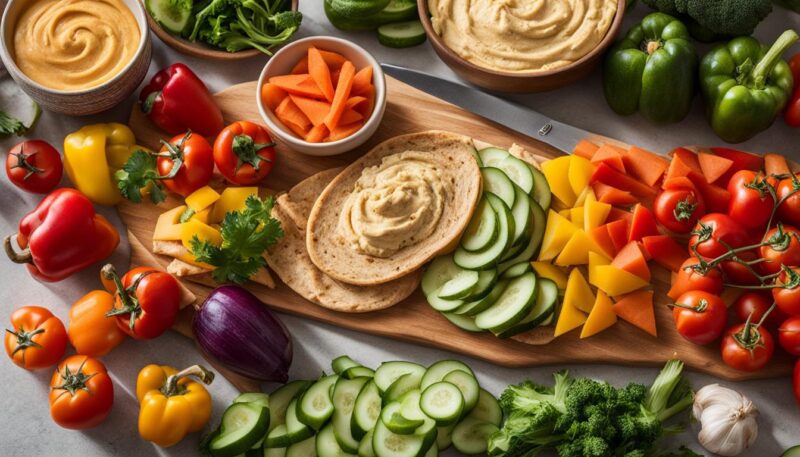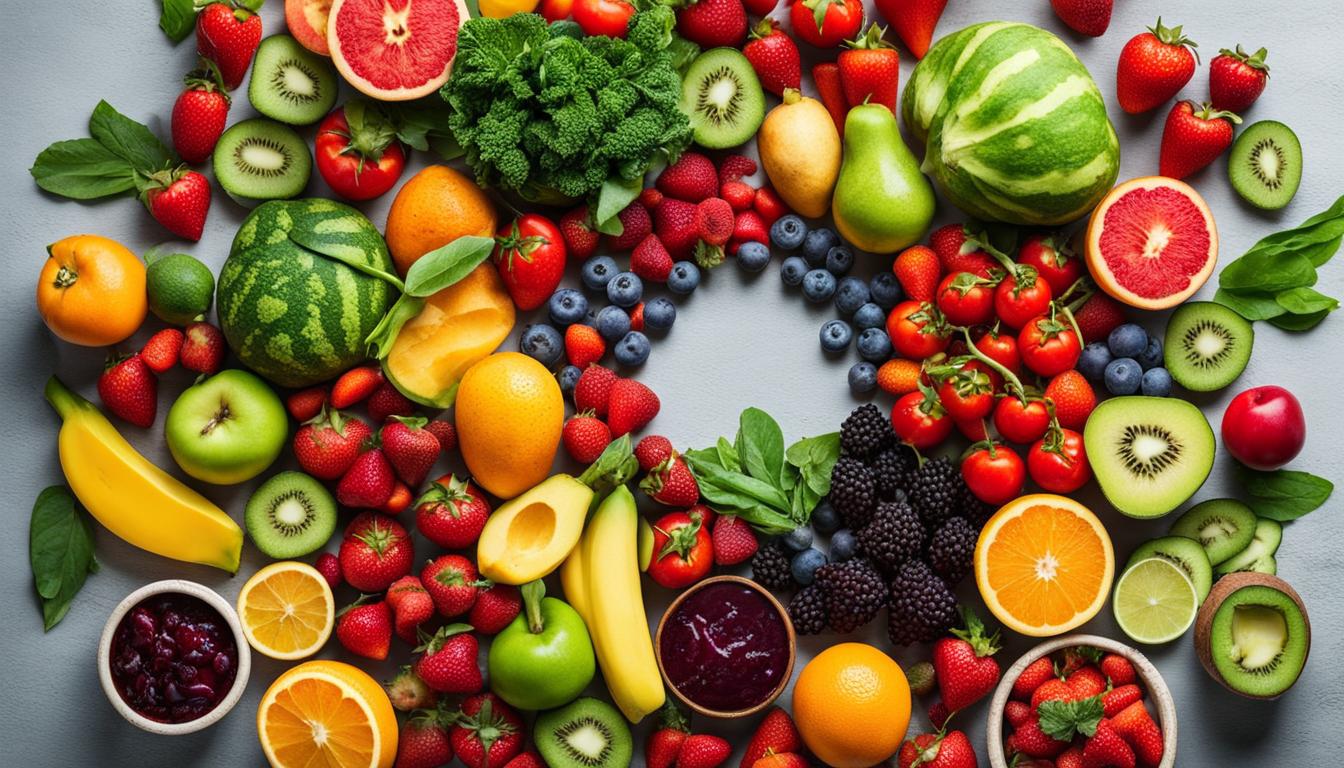Going vegan is a compassionate and animal-friendly lifestyle that involves choosing plant-based alternatives to animal products. It’s not only about what you eat but also about living in a way that causes the least harm to animals. With more vegan options available than ever before, it’s easier to transition to a plant-based diet. There are numerous resources, including cookbooks, blogs, and online communities, to support you on your vegan journey.
Key Takeaways:
- Going vegan involves choosing plant-based alternatives to animal products
- A well-rounded vegan diet is high in fiber, antioxidants, and other beneficial plant compounds
- Vegetables, fruits, grains, legumes, nuts, and seeds are key components of a vegan diet
- Vegans need to pay attention to their nutritional needs, ensuring they get enough protein, vitamins, and minerals from plant-based sources
- There are challenges associated with following a vegan diet, such as nutrient deficiencies and limited food options, that can be overcome with proper planning and education
Incorporating Vegan Foods into Your Diet
When transitioning to a vegan diet, it’s important to focus on incorporating a variety of plant-based foods into your meals. Grains, legumes, vegetables, fruits, nuts, and seeds should become staples in your pantry and refrigerator. These food groups provide essential nutrients and can be used to create diverse and delicious dishes.
Grains: Grains like quinoa, brown rice, and whole wheat pasta can be enjoyed as breakfast bowls or used as a base for salads and stir-fries. They provide a good source of carbohydrates and can be easily incorporated into your daily meals.
Legumes: Legumes such as chickpeas, lentils, and black beans are excellent sources of protein and fiber. They can be used to make flavorful soups, stews, and dips. Try adding them to your favorite recipes for an added nutritional boost.
Vegetables: Whether eaten raw or cooked, vegetables are essential for a well-rounded vegan diet. Incorporate a variety of colors and textures into your meals to ensure you’re getting a wide range of vitamins and minerals. Add them to stir-fries, salads, and roasted vegetable dishes.
Fruits: Fruits make excellent snacks and additions to smoothies. They provide natural sweetness and are packed with vitamins and antioxidants. Enjoy them on their own or blend them into refreshing smoothies for a healthy and delicious treat.
Nuts and Seeds: Nuts and seeds can be used as toppings for salads, stir-fries, and breakfast bowls, or blended into creamy nut butter. They are a great source of healthy fats and can add a satisfying crunch to your meals.
As you incorporate these vegan foods into your diet, it’s important to pay attention to your nutritional needs. Ensure you’re getting enough protein, vitamins, and minerals from plant-based sources. Consulting with a registered dietitian or nutritionist can provide personalized guidance and support.
Table: Plant-Based Sources of Essential Nutrients
| Nutrient | Plant-Based Sources |
|---|---|
| Protein | Tofu, tempeh, lentils, quinoa |
| Iron | Spinach, lentils, tofu, fortified cereals |
| Calcium | Kale, broccoli, fortified plant-based milk |
| Omega-3s | Flaxseeds, chia seeds, walnuts |
| Magnesium | Almonds, cashews, black beans |
| Vitamin D | Fortified plant-based milk, sunlight exposure |
| Vitamin B12 | Fortified nutritional yeast, supplements |
| Iodine | Seaweed, iodized salt |
By incorporating these vegan foods into your diet and being mindful of your nutritional needs, you can enjoy a balanced and satisfying plant-based lifestyle. Experiment with new recipes, explore different flavors, and discover the wide range of possibilities that vegan foods have to offer.
Nutritional Benefits of Vegan Food
A well-rounded vegan diet offers numerous nutritional benefits that support overall health and well-being. By focusing on plant-based foods, vegans can enjoy a diet that is rich in fiber, antioxidants, and beneficial plant compounds. Additionally, a vegan diet tends to be lower in saturated fat and cholesterol, which can reduce the risk of heart disease.
Vegans can obtain essential nutrients from a variety of plant-based sources. Here are key nutrients and the foods that provide them:
| Nutrient | Plant-Based Sources |
|---|---|
| Protein | Beans, lentils, tofu, tempeh, quinoa, and hemp seeds |
| Iron | Lentils, spinach, tofu, and fortified cereals |
| Calcium | Kale, broccoli, tahini, fortified plant-based milks |
| Omega-3s | Chia seeds, flaxseeds, walnuts, and algae-based supplements |
| Magnesium | Pumpkin seeds, almonds, spinach, and quinoa |
| Vitamin D | Fortified plant-based milks, mushrooms exposed to sunlight |
| Vitamin B12 | Fortified plant-based milks, nutritional yeast, supplements |
| Iodine | Sea vegetables, iodized salt, and supplements |
It’s important for vegans to be mindful of their nutritional needs and ensure they are getting adequate amounts of these nutrients. While many can be obtained through a well-planned vegan diet, supplements may be necessary for certain nutrients such as vitamin B12. Consulting with a registered dietitian or healthcare professional can provide personalized guidance on meeting nutritional needs as a vegan.
Vegan food not only brings positive health benefits but also contributes to a more sustainable and ethical lifestyle. By choosing plant-based alternatives, individuals can support animal welfare and reduce their environmental impact. Incorporating a variety of vegan foods into a balanced diet can help promote optimal health and well-being.
Easy and Delicious Vegan Recipes
With the abundance of vegan ingredients and innovative plant-based products available today, creating easy and delicious vegan recipes has never been easier. Whether you’re a seasoned vegan or just starting to explore plant-based cooking, these recipes are sure to satisfy your taste buds and nourish your body.
Stir-Fried Tofu and Vegetable Rice
This flavorful stir-fry combines crispy tofu, colorful vegetables, and fragrant spices, served over a bed of fluffy rice. To make this dish, simply sauté diced tofu in a hot pan with soy sauce, sesame oil, minced garlic, and ginger. Add your favorite vegetables, such as bell peppers, broccoli, and snap peas, and stir-fry until tender-crisp. Serve the stir-fry over cooked rice for a complete and satisfying meal.
Roasted Vegetable Pasta
Roasted vegetables add a depth of flavor to this comforting pasta dish. Toss your choice of vegetables, such as cherry tomatoes, zucchini, and eggplant, with olive oil, salt, and pepper, and roast in the oven until caramelized and tender. Cook your favorite pasta according to the package instructions and toss it with the roasted vegetables. Finish with a drizzle of extra virgin olive oil and a sprinkle of fresh herbs for a delicious and filling plant-based meal.
Chickpea Salad Wraps
For a quick and satisfying lunch or dinner option, whip up a batch of chickpea salad wraps. Mash canned chickpeas with vegan mayonnaise, Dijon mustard, lemon juice, and your favorite herbs and spices, such as garlic powder, cumin, and paprika. Spread the chickpea salad onto whole wheat wraps and top with fresh veggies like lettuce, tomatoes, and cucumbers. Roll them up and enjoy a flavorful and nutritious handheld meal.
| Recipe | Difficulty | Preparation Time | Servings |
|---|---|---|---|
| Stir-Fried Tofu and Vegetable Rice | Easy | 30 minutes | 4 |
| Roasted Vegetable Pasta | Intermediate | 45 minutes | 6 |
| Chickpea Salad Wraps | Easy | 15 minutes | 2 |
These recipes are just a taste of the wide variety of easy and delicious vegan meals you can enjoy. Don’t be afraid to experiment with different flavors, ingredients, and cooking methods to discover new favorites. Whether you’re cooking for yourself, your family, or hosting a gathering, vegan recipes can be both satisfying and nourishing for all.

Common Challenges of Following a Vegan Diet
While transitioning to a vegan lifestyle can be rewarding, it also comes with its fair share of challenges. Understanding and overcoming these obstacles is essential for a successful and sustainable vegan journey. Here are some common challenges faced by individuals following a vegan diet:
- Nutrient Deficiencies: One of the main concerns for vegans is ensuring they meet their nutritional needs, particularly for key nutrients like protein, iron, calcium, and vitamin B12. It’s important to plan meals carefully and consider taking supplements to compensate for any potential deficiencies.
- Limited Food Options: Depending on where you live, finding vegan-friendly restaurants and grocery stores may be a challenge. However, with the growing popularity of plant-based diets, more options are becoming available. Online sources and specialty shops can also provide a wider range of vegan products and ingredients.
- Navigating Social Situations: Attending social events or dining out with friends and family who don’t follow a vegan lifestyle can be tricky. It’s important to communicate your dietary preferences in advance and offer to bring a dish that everyone can enjoy. Sharing information about veganism and its benefits can also help others understand and accommodate your choices.
- Meal Planning and Preparation: Adopting a vegan diet often requires more planning and preparation compared to traditional diets. Creating a weekly meal plan, batch cooking, and prepping ingredients in advance can help save time and ensure you have nutritious meals readily available.
By acknowledging and addressing these challenges, individuals can overcome barriers to their vegan lifestyle and enjoy the many benefits it offers. With the right knowledge, resources, and support, following a vegan diet can be a fulfilling and sustainable choice.
Quotes from Vegan Advocates:
“The biggest challenge of following a vegan diet is debunking the myth that it’s restrictive. In reality, a vegan diet can be incredibly diverse and enjoyable, offering a wide range of flavors and cuisines.” – Jane Doe, Vegan Chef and Author
“The key to overcoming challenges on a vegan journey is education. Understanding how to meet your nutritional needs, discovering new recipes and ingredients, and staying connected to the vegan community can make all the difference.” – John Smith, Vegan Nutritionist
Tips for Overcoming Challenges:
- Research and educate yourself about vegan nutrition to ensure you’re meeting your dietary requirements.
- Explore online resources, vegan cookbooks, and social media platforms for recipe inspiration and support from like-minded individuals.
- Join local vegan groups or online communities to connect with others who share similar experiences and can provide guidance and advice.
- Experiment with new ingredients and cooking methods to keep meals exciting and avoid feeling restricted.
- Stay positive and focus on the benefits of a vegan lifestyle, both for your health and the environment.
By embracing these tips and proactively addressing the challenges, you can navigate the vegan lifestyle with confidence and thrive on your plant-based journey.
Vegan Books and Resources
As a vegan, it’s important to have access to reliable information and resources to support your plant-based lifestyle. Fortunately, there is a wide range of vegan books and resources available that can provide inspiration, guidance, and valuable insights. Whether you’re new to veganism or a seasoned plant-based enthusiast, these resources offer a wealth of knowledge and expertise.
If you’re looking for delicious and family-friendly recipes, vegan cookbooks are a great place to start. Books like “Boost Your Breast Milk” and “But My Family Would Never Eat Vegan!” offer a variety of tasty and easy-to-make dishes that will satisfy even the pickiest eaters. These books can help you navigate the challenges of cooking for a mixed-diet household and provide inventive ways to incorporate more plant-based options into your meals.
If you’re an athlete or someone with specific dietary needs, books like “The No Meat Athlete Cookbook” and “Quick & Easy Vegan Comfort Food” cater to your unique requirements. These resources offer recipes that are not only delicious but also packed with the nutrients needed to fuel an active lifestyle. Whether you’re a marathon runner or just enjoy staying active, these books provide valuable information on optimizing your performance through plant-based nutrition.
“Plant-Powered for Life” and “Never Too Late to Go Vegan” are excellent resources for those seeking deeper insights into vegan nutrition. These books go beyond recipes and delve into the science of plant-based eating, providing evidence-based information on meeting your nutritional needs. From understanding essential nutrients to debunking common myths, these resources empower you with the knowledge to thrive on a vegan diet.
Table: Recommended Vegan Books
| Title | Author | Description |
|---|---|---|
| “Boost Your Breast Milk” | Anne E. Pitt, Patricia Archer | A cookbook with vegan recipes that support breastfeeding mothers and provide essential nutrients. |
| “But My Family Would Never Eat Vegan!” | Kristy Turner | A collection of family-friendly recipes that help transition to a plant-based lifestyle. |
| “The No Meat Athlete Cookbook” | Matt Frazier, Stepfanie Romine | An athlete-focused cookbook with recipes tailored for performance and recovery. |
| “Quick & Easy Vegan Comfort Food” | Alicia C. Simpson | A book that offers comforting and satisfying vegan dishes for every occasion. |
| “Plant-Powered for Life” | Sharon Palmer | A comprehensive guide to vegan nutrition, focusing on health benefits and meal planning. |
| “Never Too Late to Go Vegan” | Carol J. Adams, Patti Breitman, Virginia Messina | A resource that addresses common concerns and provides practical advice for transitioning to a vegan lifestyle. |
These vegan books and resources are just a sample of what’s available to support you on your plant-based journey. Whether you’re seeking recipe inspiration, nutritional guidance, or tips for navigating social situations, these resources can provide the information and motivation you need to thrive as a vegan.

Conclusion
Embracing a vegan lifestyle offers a myriad of benefits for both individuals and the planet. Not only does it improve our overall immunity and support heart health, but it also helps reduce our environmental impact. While there may be challenges associated with following a vegan diet, such as nutrient deficiencies and limited food options, these obstacles can be overcome with proper planning and education.
By incorporating easy and delicious vegan recipes into our diets and utilizing the abundance of vegan books and resources available, we can find inspiration and guidance to enjoy delicious and satisfying plant-based meals. With grains, legumes, vegetables, fruits, nuts, and seeds forming the foundation of a vegan diet, we can ensure that our nutritional needs are met while minimizing harm to animals.
In conclusion, adopting a vegan lifestyle not only allows us to make a positive impact on our own health but also contributes to animal welfare and the overall well-being of our planet. By choosing plant-based living, we empower ourselves to lead compassionate and sustainable lives that benefit not only ourselves but also the world around us.
FAQ
What is a vegan diet?
A vegan diet is a compassionate and animal-friendly lifestyle that involves choosing plant-based alternatives to animal products.
What foods are included in a vegan diet?
Grains, legumes, vegetables, fruits, nuts, and seeds are key components of a vegan diet.
What nutrients do vegans need to pay attention to?
Vegans need to ensure they get enough protein, iron, calcium, omega-3s, magnesium, vitamins D and B12, and iodine.
How can I incorporate vegan foods into my diet?
Vegan foods can be enjoyed in a variety of ways, such as in stir-fries, pasta dishes, grain bowls, soups, and smoothies.
What are the challenges of following a vegan diet?
Challenges of following a vegan diet include nutrient deficiencies, limited food options in certain areas, navigating social situations, and meal planning and preparation.
Are there resources available to support a vegan lifestyle?
Yes, there are a wealth of vegan books and resources available to provide information, inspiration, and guidance for achieving a healthy and sustainable vegan lifestyle.

